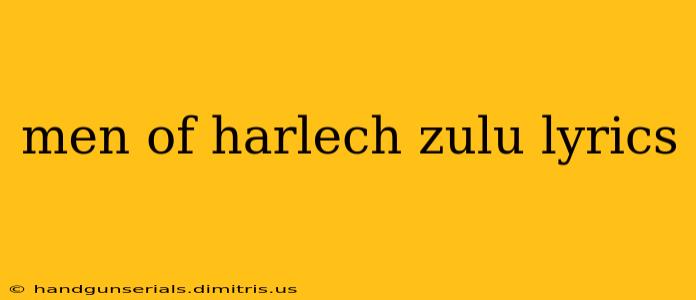The stirring Welsh melody of "Men of Harlech" has transcended its origins, finding resonance across cultures and inspiring adaptations like the powerful Zulu version. This exploration delves into the Zulu adaptation of "Men of Harlech," examining its lyrics, historical context, and cultural significance. We'll uncover how a song born from medieval Welsh defiance echoes in the heart of Zulu history and identity.
Understanding the Original: "Men of Harlech"
Before we delve into the Zulu interpretation, let's briefly revisit the original "Men of Harlech." This Welsh military song, believed to date back to the 15th century, celebrates the courageous defense of Harlech Castle against English forces during the Wars of the Roses. Its powerful lyrics evoke themes of bravery, resilience, and unwavering loyalty to one's homeland. This powerful narrative of resistance and fortitude resonates far beyond its Welsh origins.
The Zulu Adaptation: A Tale of Two Cultures
The Zulu adaptation of "Men of Harlech" cleverly retains the original melody while transforming the lyrics to reflect Zulu history, struggles, and triumphs. While precise translations and readily available resources on specific Zulu lyrical adaptations are somewhat limited, the underlying sentiment remains consistent: a celebration of strength, resilience, and unwavering spirit in the face of adversity.
Themes Reflected in the Zulu Lyrics (Inferred):
Given the spirit of the original and the known historical context of Zulu resistance, the Zulu lyrics likely focus on several key themes:
- Shaka Zulu and the rise of the Zulu Kingdom: The Zulu nation's history is filled with powerful stories of military prowess and expansion under Shaka Zulu. The lyrics likely evoke images of this era, celebrating the strength and unity of the Zulu people under his leadership.
- Resistance against Colonialism: The Zulu people endured fierce struggles against British colonial forces. The song's adaptation could thus serve as a poignant reminder of their resistance and the fight for their land and independence.
- Maintaining Cultural Identity: The adaptation likely reinforces Zulu cultural pride and identity in the face of historical oppression and cultural assimilation. It acts as a powerful symbol of cultural preservation and strength.
- Modern Zulu Identity: Even if the lyrics are based on historical events, the song's continued use within the modern Zulu context allows for a reflection on contemporary challenges and the ongoing fight for justice and equality.
The Power of Musical Adaptation: Bridging Cultures
The adaptation of "Men of Harlech" into Zulu highlights the universal appeal of powerful narratives. The melody's inherent strength lends itself to conveying different yet equally poignant stories. The act of translating the song demonstrates a fascinating cultural exchange, a silent testament to the shared human experiences of struggle, resistance, and the indomitable spirit that defines various peoples.
Finding Further Information:
Unfortunately, readily accessible resources with complete Zulu lyrics for this adaptation are scarce. Further research into Zulu musical archives and historical texts may reveal more precise details. Academic works on Zulu music and culture could also provide valuable insights into the nuances of this adaptation and its significance within Zulu history and culture.
Conclusion: A Legacy of Defiance
The Zulu adaptation of "Men of Harlech," although lacking widely available detailed information on specific lyrics, reveals a profound cultural exchange. It underscores the power of music to transcend linguistic and geographical boundaries, carrying stories of resilience, resistance, and the enduring human spirit across cultures. The song's enduring presence serves as a testament to both the original’s compelling melody and the Zulu people’s rich and powerful history.

